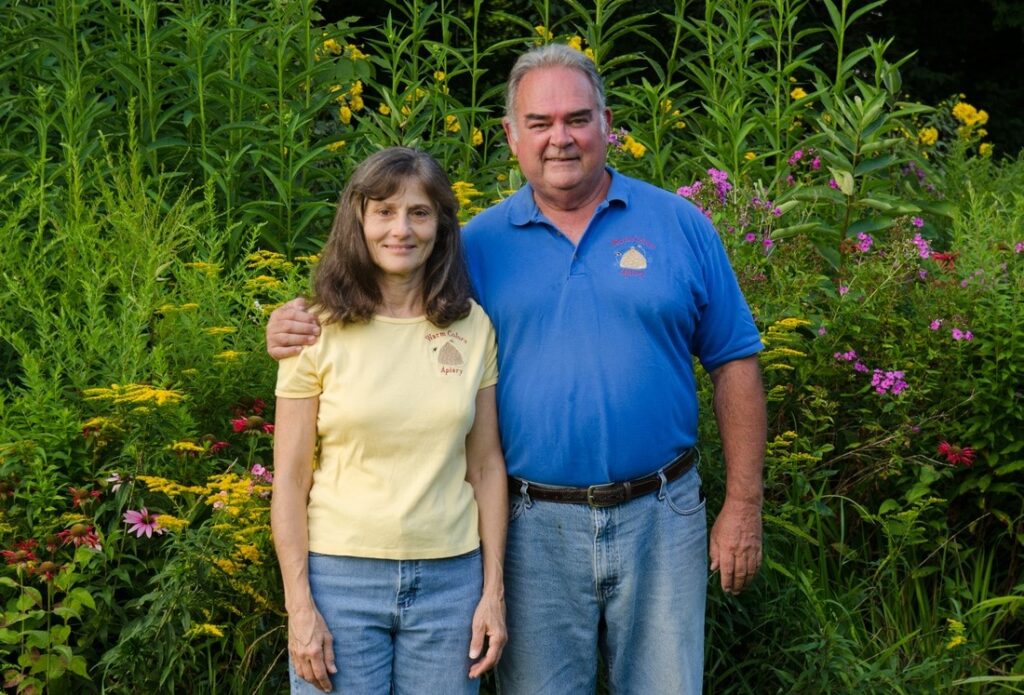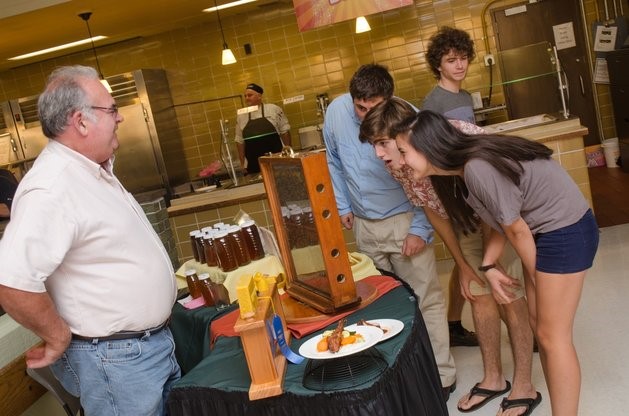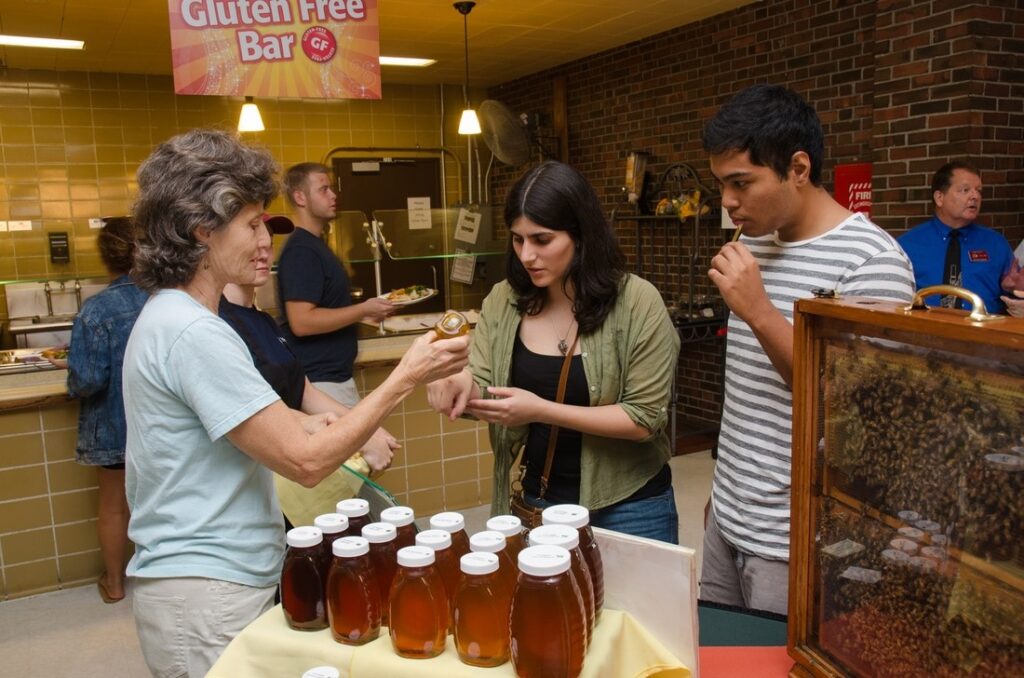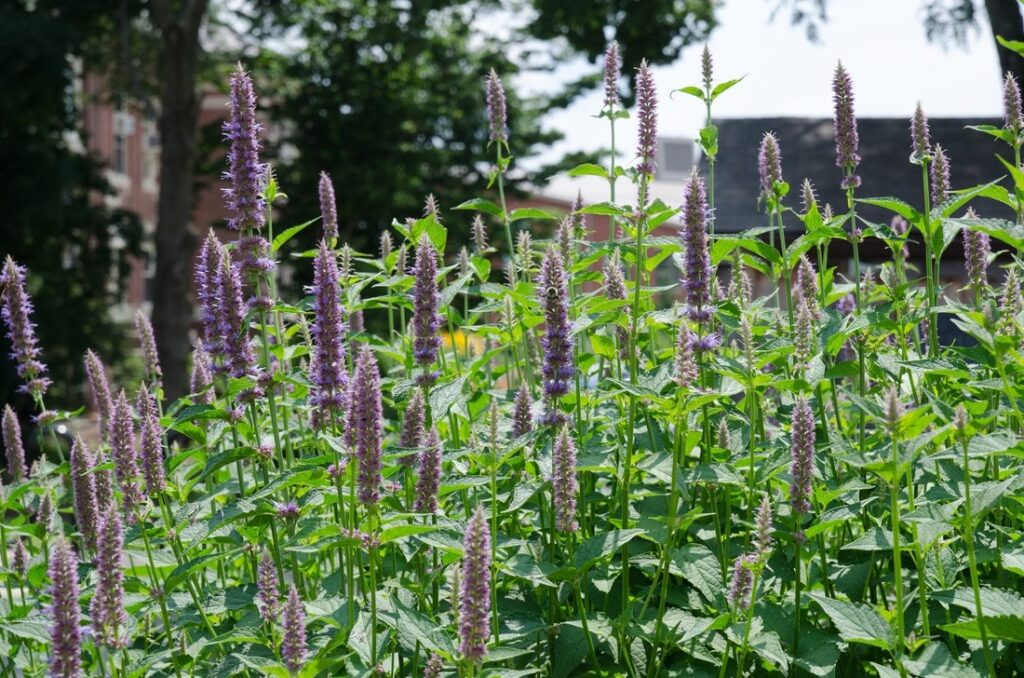
Dan and Bonita Conlon, owners of Warm Colors Apiary, in front of their pollinator plants. [Image by Keith Toffling]
Warm Colors Apiary, owned by Dan and Bonita Conlon, is located on eighty acres of woodland, open fields and wetlands, in South Deerfield, MA. Dan and Bonita manage about 1,200 colonies of bees, which can provide up to 30,000 pounds of honey a year. UMass Dining purchases about 25% of the honey Warm Colors Apiary produces for use in the UMass Bakeshop and in all the Dining Commons as well.

Dan Conlon, displaying his bees at Franklin Dining Commons. [Image by Keith Toffling]
Dan Conlon has kept bees since he was 14, and at the age of 50, Dan and Bonita quit their jobs, bought 1,000 beehives, and became full time beekeepers. “Now I am 66 and I am really happy with my lifestyle. It fits a philosophy that you are building rather than destroying something,” Dan shared.
There are about 90 commercial crops that require pollination and most of them are fruits, nuts, and vegetables. Honey bees are the only pollinator that can be moved around in large enough numbers to pollinate these crops. For crops like apples and peaches, the window for pollination is very short, and only lasts for a day or two. Dan explained that “in the valley, one beehive on one acre of cucumbers increases production by 40-60%.” Warm Colors Apiary transports bees to different farms all over Western Massachusetts, many of them operations that UMass Dining sources vegetables from to help them increase their yields.
Honey bees also pollinate wildflowers, which provide food for wildlife and birds, purify water, and clean the air. Bees also increase the resilience and biodiversity of the plants they pollinate. “This whole idea of bees and pollination is fundamental to our existence,” said Dan.

Bonita Conlon, doing a honey tasting for students at Franklin Dining Commons. [Image by Keith Toffling]
Dan and Bonita are part of the Russian Honey Breeders Association and have been working with the USDA to develop disease and mite resistant bees for the last 20 years. “Beekeeping is a lot harder than it used to be. When I started there was only one disease beekeepers worried about- now we have about a dozen.” Additionally, climate change and drought have a huge effect on bee populations. The drought this summer caused the flowers to run out of moisture and stop producing nectar. “This fall was the first time we hadn’t taken honey in 15 or 20 years,” Dan said. Bonita and Dan are worried that they will lose more bees to the persisting cold weather because of the drought and due to a lack of food.

Anise Hyssop, a perennial flowering plant that attracts many pollinators. [Image by Keith Toffling]
Bee populations are declining rapidly, and one of the main causes is the loss of forage and food sources in the landscape. “I think there is an urgency to all of [these issues] and we have to quit denying that it’s true. It is happening as we speak,” Dan remarked. Dan suggests that “the best thing we can do is encourage everyone to get out there and plant something.” There are hundreds of plants that benefit bees. Just a few include sunflowers, bulbs, thyme, lavender, maple trees, fruit trees, raspberry and blackberry bushes. Additionally, Dan recommends to allow the dandelions and other flowering weeds to grow in lawns. “It is also important to support bee research, which has given us a whole lot of options that we did not have 20 years ago,” Dan added.
A huge thanks to Warm Colors Apiary for working with us and for all that they do for our community and environment. Also, a special thanks to Dan for interviewing with us. For more information about visit the Warm Colors Apiary website.
Images provided by Keith Toffling.
